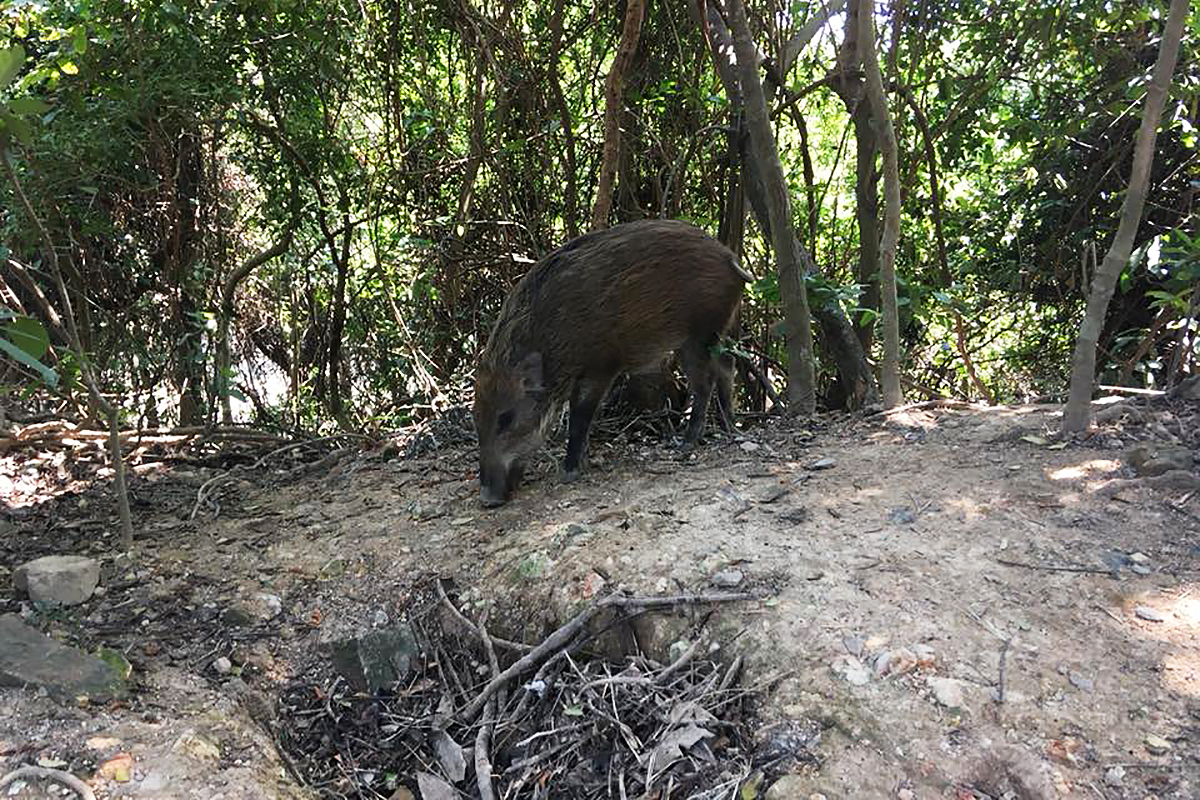Wild boar in the city: Hills around Hong Kong's skyscrapers are alive with swine
Sign up now: Get insights on Asia's fast-moving developments

A photo provided by Mr Steve Corry shows a wild boar he sighted in Aberdeen Reservoir in Hong Kong in March 2018.
PHOTO: STEVE CORRY VIA NYTIMES
Follow topic:
HONG KONG (NYTIMES) - Three wild boars were spotted on Tuesday (Oct 9) as they sauntered down a pavement near the Hong Kong equivalent of Times Square in New York.
They were trailed by police officers, shot with a tranquilliser gun and released into some parkland on the city's rural fringes.
But they'll be back.
Unbeknown to most visitors, the green hills surrounding Hong Kong's skyscrapers are alive with swine: Wild boars regularly spook hikers and joggers on walking trails, and sometimes wander into dense urban areas to dumpster dive.
For years, the authorities have tried to stabilise Hong Kong's wild boar population through licensed hunting and other measures. Yet "wild pig nuisances", as officials call porcine problems in this semi-autonomous Chinese city, rose to 738 last year from 294 in 2013, and social media chatter about wild boar run-ins has become commonplace.
On Wednesday, a day after the boars were tranquillised in the Causeway Bay district, two people were hospitalised after a different wild boar attacked them at a public housing estate on the Kowloon peninsula.
One of the victims, a 65-year-old security guard who was bitten as she walked to a public toilet, later said that her assailant was as large as a human.
Yet by the time police arrived, the boar had vanished.
Wild boars, also known as Eurasian wild pigs, are the largest terrestrial mammals in Hong Kong, a city of more than seven million people, according to the local Agriculture, Fisheries and Conservation Department. The pigs can grow to over 180kg, and their population soars here because they have no natural predators.
They are not generally violent towards humans, but they sometimes wander from Hong Kong's countryside into nearby shopping malls, playgrounds and public barbecue sites in search of food, raising the potential for conflicts.
Some have even been spotted galloping down Hong Kong highways and swimming in the city's main harbour.
In March alone, police officers carrying riot shields subdued a boar on the tarmac at Hong Kong International Airport, and footage of an enormous "emperor" boar sniffing around a Hong Kong dumpster made international headlines.
The government has tried to quietly control the population of wild boars and other wildlife in recent years with various strategies, to mixed reviews.
Notably, a programme in which local officials allowed locals to hunt wild boars produced hundreds of kills - 281 from 2009 to 2013, according to government data. Hong Kong's Environment Secretary Wong Kam Sing, once called the hunts, which began in the 1970s, an "effective measure" for controlling the boar population.
Although the animals are not protected under Hong Kong law, the hunts were suspended last year after lawmakers and animal rights activists called them inhumane and impractical. The activists say the government should focus instead on managing the disposal of solid waste so that the boars do not eat it.
"We think hunting and killing - even eating in some cases - wild pigs is an outdated custom," animal rights activist Leung Mei Po told Hong Kong Free Press, a local news site. "This practice should have no place in today's Hong Kong."
Wild boars are widespread in Hong Kong and normally live there in a "natural environment", the agriculture department said in an e-mail, adding that the animals can become accustomed to searching for food in residential areas if they are fed there or can easily find food in rubbish bins.
The department also said that wild boar hunting had been suspended pending a review, and that it was using radio and television campaigns to urge the public not to feed the boars.
In March, Hong Kong officials said they would spend two years trying to reduce the population of wild boars by trapping them, injecting them with contraceptives and outfitting them with GPS devices so that officers can track their movements.
Some Hong Kongers have sympathy for the boars' predicament.
"It's not fair to call these conflicts a 'problem' because it makes it seem like the responsibility of the animal," said Mr Roni Wong, a representative for the Wild Boar Concern Group, a Hong Kong advocacy group.
He added that wild boars do not typically attack humans unless they are provoked or frightened.
Mr Steve Corry, 44, says he regularly sees wild boars while running on Hong Kong's hiking trails.
"Each time they are calm, and if you leave them alone, they will leave you alone," he said.
Others are losing patience, or living in fear.
This summer, for example, two administrators at the University of Hong Kong were hospitalised after being attacked by wild boars near campus, in an upscale residential area on the city's main island.
The authorities later sedated and removed several boars from a nearby hillside. But Mr Stephen Chan, a local lawmaker, blamed the agriculture department for not being tough enough and said that more should be done to prevent the animals from colonising residential areas.
"I am not suggesting that we should kill all wild pigs," Mr Chan told local news media. "But we should consider tougher actions to control the population."

